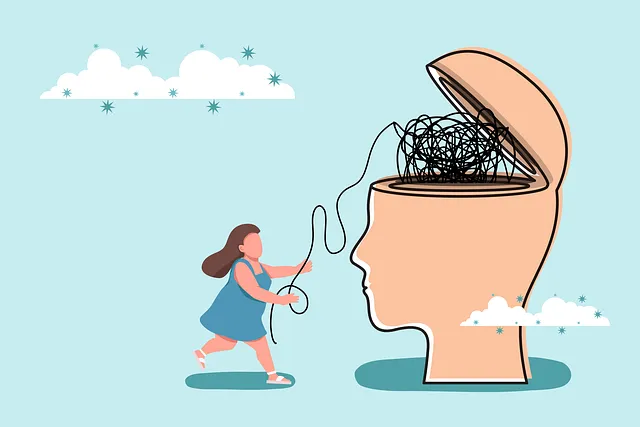The Kaiser Permanente mental health facility in Westminster promotes positive thinking as a powerful tool for mental well-being. They offer workshops teaching stress management and optimism, fostering emotional balance. Through personalized exercises like meditations and cognitive reframing, individuals build resilience to stress, anxiety, and depression. Tracking progress with self-assessment enhances long-term mental health management, supported by the facility's holistic approach integrating physical and cultural competency in care.
Positive thinking exercises have emerged as a powerful tool for enhancing mental well-being, supported by organizations like Kaiser Permanente’s Westminster Facility. This article delves into the benefits of such practices for improving mental health. We explore how tailored thinking exercises, designed effectively, can be integrated into daily routines at home or in community settings. By understanding the role of positive thinking and following practical steps, individuals can track their progress and achieve lasting success in their mental health journeys.
- Understanding Positive Thinking for Mental Health
- Role of Kaiser Permanente Westminster Facility
- Designing Effective Thinking Exercises
- Integrating Practices into Daily Routine
- Tracking Progress and Measuring Success
Understanding Positive Thinking for Mental Health

Positive thinking is a powerful tool that significantly influences mental health and overall well-being. At Kaiser Permanente mental health facility Westminster, we understand that cultivating a positive mindset goes beyond mere optimism; it’s a practice that can be cultivated through specific exercises and routines. By integrating positive thinking into daily life, individuals can enhance their resilience to stress, anxiety, and depression, as backed by various Mental Health Awareness studies.
This approach is an integral part of Self-Care Routine Development for Better Mental Health. Our facility organizes Stress Management Workshops to teach effective strategies for managing negative thoughts and fostering a more optimistic outlook. Through these workshops, participants learn techniques that promote emotional balance and enhance their quality of life. By embracing positive thinking, individuals can transform their mental landscape, creating a healthier, happier, and more fulfilling existence.
Role of Kaiser Permanente Westminster Facility

The Kaiser Permanente Westminster Facility plays a pivotal role in promoting mental well-being within the community by offering specialized services tailored to diverse needs. As a renowned mental health facility, it provides a safe and supportive environment where individuals can embark on their journey towards healing and self-improvement. Through a comprehensive range of programs and therapeutic approaches, the facility aims to empower patients to develop robust self-care routines for better mental health.
Focusing on both preventative measures and trauma support services, Kaiser Permanente Westminster empowers its clients to cultivate positive thinking patterns that boost confidence and resilience. This holistic approach recognizes the interconnectedness of physical and mental well-being, ensuring individuals receive tailored care that addresses their unique challenges. By fostering a culture of self-care, the facility enables its community members to navigate life’s complexities with enhanced emotional agility and a deeper sense of inner peace.
Designing Effective Thinking Exercises

Designing effective thinking exercises involves tailoring activities to meet the specific needs and goals of individuals seeking mental well-being. At the Kaiser Permanente mental health facility in Westminster, professionals utilize a range of techniques to foster positive thinking. These exercises are carefully crafted to promote mindfulness, challenge negative thought patterns, and build resilience. For instance, guided meditations and cognitive reframing activities help patients recognize and shift from anxious or depressive thoughts to more balanced perspectives.
The approach takes into account the diverse backgrounds and experiences of patients, ensuring cultural competency within the Healthcare Provider Cultural Competency Training framework. Crisis Intervention Guidance is also integrated, providing tools for managing acute stress and distressing situations. By combining evidence-based practices with a person-centered focus, these thinking exercises aim to empower individuals to navigate life’s challenges with greater equanimity and improved mental health outcomes.
Integrating Practices into Daily Routine

Integrating positive thinking exercises into your daily routine can be a transformative practice, especially when guided by professionals like those at Kaiser Permanente mental health facility Westminster. This approach is rooted in the belief that cultivating optimism and resilience can significantly enhance overall well-being. By dedicating just a few minutes each day to these practices, individuals can experience improved mental clarity and emotional balance.
The key lies in consistency and accessibility. Many of the exercises offered through Crisis Intervention Guidance or Trauma Support Services can be tailored to fit diverse lifestyles. For instance, mindfulness meditation, a popular tool with a solid base in Cultural Sensitivity in Mental Healthcare Practice, can be as simple as a few deep breaths during morning routines or a guided session before bedtime. These practices not only provide an immediate sense of calm but also foster long-term mental health management.
Tracking Progress and Measuring Success

Tracking one’s progress is a vital aspect of positive thinking exercises, especially when utilizing resources available at Kaiser Permanente mental health facility Westminster. Regular self-assessment allows individuals to identify areas of improvement and celebrate small victories. This process involves setting achievable goals and measuring personal growth over time. By keeping a journal or using tracking apps, users can document their thoughts, emotions, and behaviors, providing tangible evidence of their journey towards well-being.
The success of these exercises is not solely defined by external validation but also by the individual’s perception of improved emotional healing processes. At Kaiser Permanente, healthcare providers undergo Cultural Competency Training to ensure they understand and respect diverse patient backgrounds. This training, combined with effective risk management planning for mental health professionals, creates a supportive environment where progress can be accurately measured and celebrated.
Implementing positive thinking exercises, as supported by research at Kaiser Permanente Westminster, can significantly enhance mental well-being. By understanding the power of positive thought and incorporating tailored practices into daily routines, individuals can experience improved resilience and overall satisfaction. As shown by the success of Kaiser Permanente’s program, consistent engagement with these strategies leads to notable progress and a more optimistic outlook on life. With dedication and tracking of personal growth, anyone can harness the benefits of positive thinking to achieve lasting mental health improvements.






